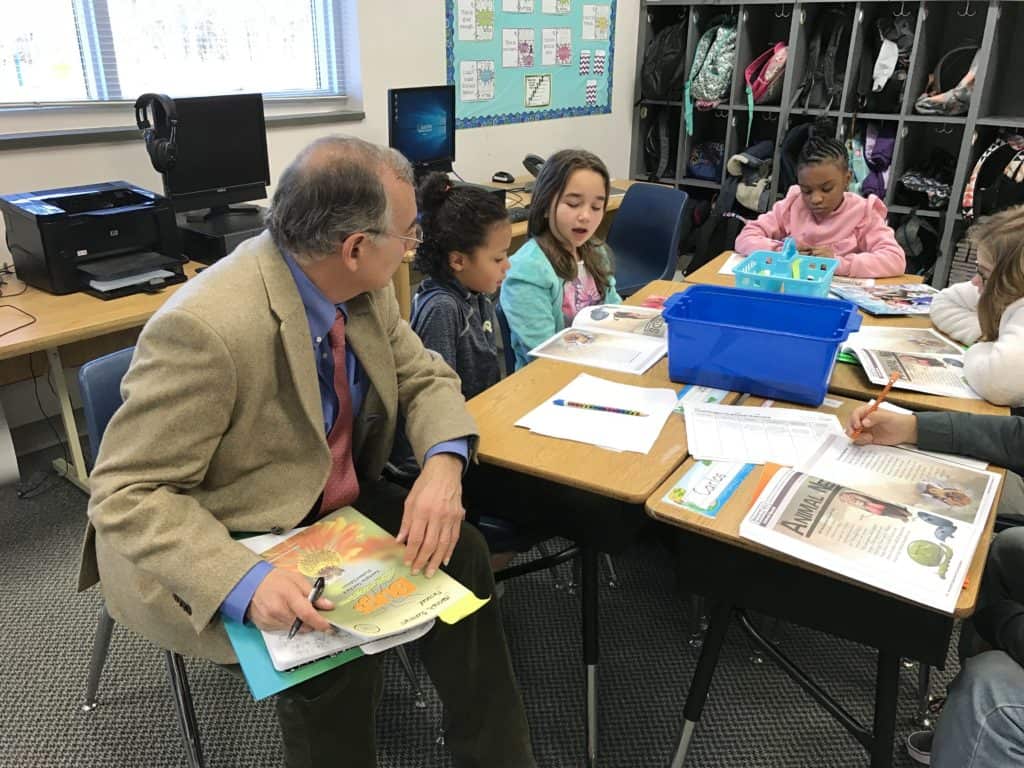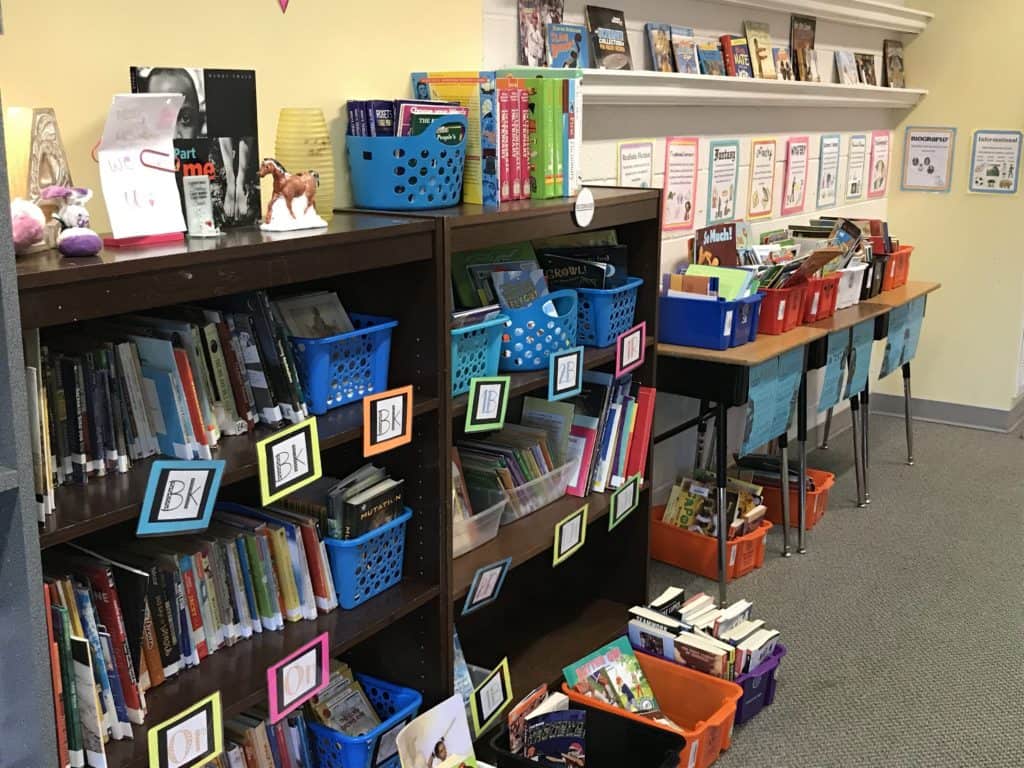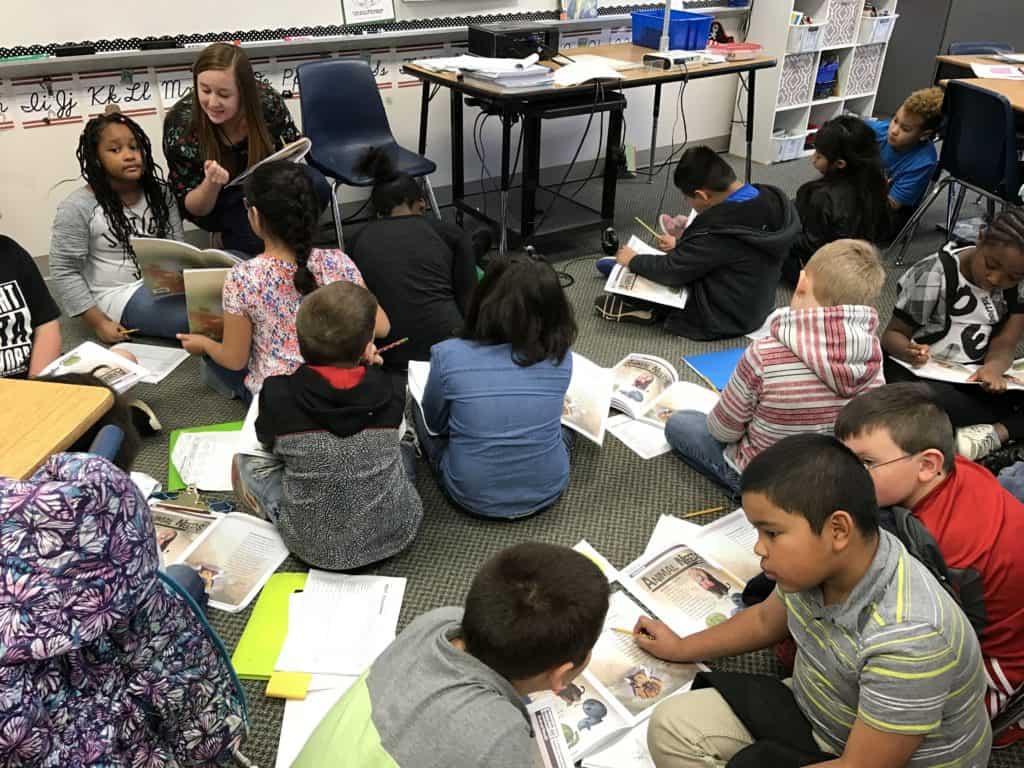This blog post is part of a series about the Knowledge Matters School Tour. It was originally posted on the Knowledge Matters website in February 2018. It has been re-posted here with permission.
Monticello-Brown Summit Elementary School is one of 71 elementary schools in Guildford County Public Schools, the third largest school district in North Carolina. They recently adopted an English language arts curriculum designed to help build children’s knowledge of the world: American Reading Company’s ARC Core. This is their story.
Spoiler alert: You might think that a brand-new curriculum (with a lot going on inside of it), in its first year of adoption, with a newly minted principal is a formula for disaster – but that’s not what’s going to happen here!
The ARC curriculum is garnering attention from school districts around the country because it looks and feels a lot like the “balanced literacy” with which so many are familiar. This was certainly a factor in its selection by Guilford County.
In fact, ARC Core is quite different. To begin with, while kids work with “leveled books” based on skills they have and have not yet mastered (identified through ARC’s Independent Reading Level Assessment or IRLA), one gets the impression of very intentional movement through levels rather than languishing in one, as all too often happens in traditional leveled programs. There is much celebration when students move to a new level, and surprisingly little competition about at which level students are.
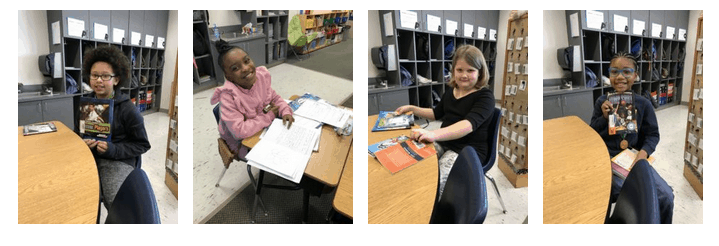 Each level has a set of “power goals” – and every student we talked could tell us what his/her power goal was (e.g. see Jaylen below whose goal is identifying the antagonist and protagonist in narrative text). Students “conference” one-on-one, or in nimble, flexible groups, with their teacher and are assessed for comprehension, vocabulary, and foundational skills before they move on. If they can’t move, they know precisely why.
Each level has a set of “power goals” – and every student we talked could tell us what his/her power goal was (e.g. see Jaylen below whose goal is identifying the antagonist and protagonist in narrative text). Students “conference” one-on-one, or in nimble, flexible groups, with their teacher and are assessed for comprehension, vocabulary, and foundational skills before they move on. If they can’t move, they know precisely why.
Another difference here is that all of the books are published trade literature, as opposed to leveled readers which are written specifically to be used in leveled programs. Since the publisher is one of the largest children’s book distributors in the US, districts can customize the units, selecting topics they know will appeal to their students or that match state social studies and science standards. Not only the core text is customizable, but so are all the leveled “bins” that correspond to it, giving students a wide variety of texts from which to choose when working on their power goals.
But there is more. ARC is organized around topic-based units, each of which includes a “research lab” that features a grade-level core text – rich in vocabulary and content – that all students read and around which whole class discussion takes place. Students chose a research topic related to the content of the core text and read additional books at a variety of complexity levels to complete a culminating research assignment. From everything we heard from students, the end-of-unit project is a real highlight of ARC Core.
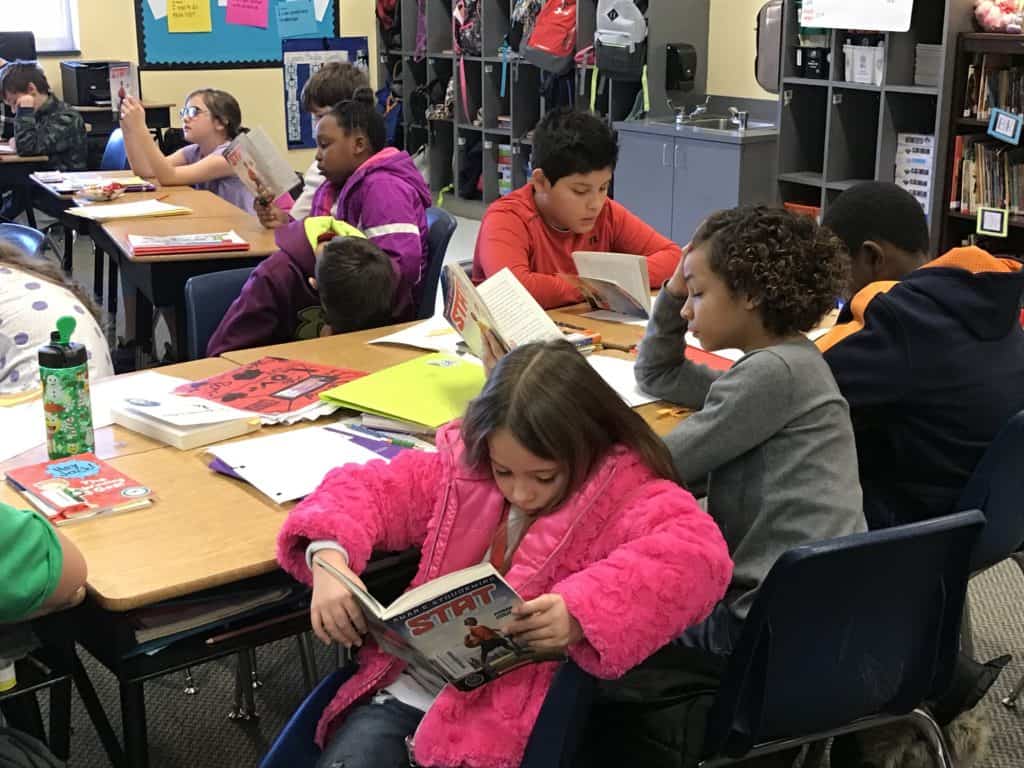
Finally, in addition to IRLA and the Research Labs, ARC includes 30 minutes of independent reading time where students can choose texts at any level.
The result of all this is that kids are reading – A LOT! In fact, it is the volume of reading – and engagement with books – that really is the story of Monticello-Brown Summit Elementary.
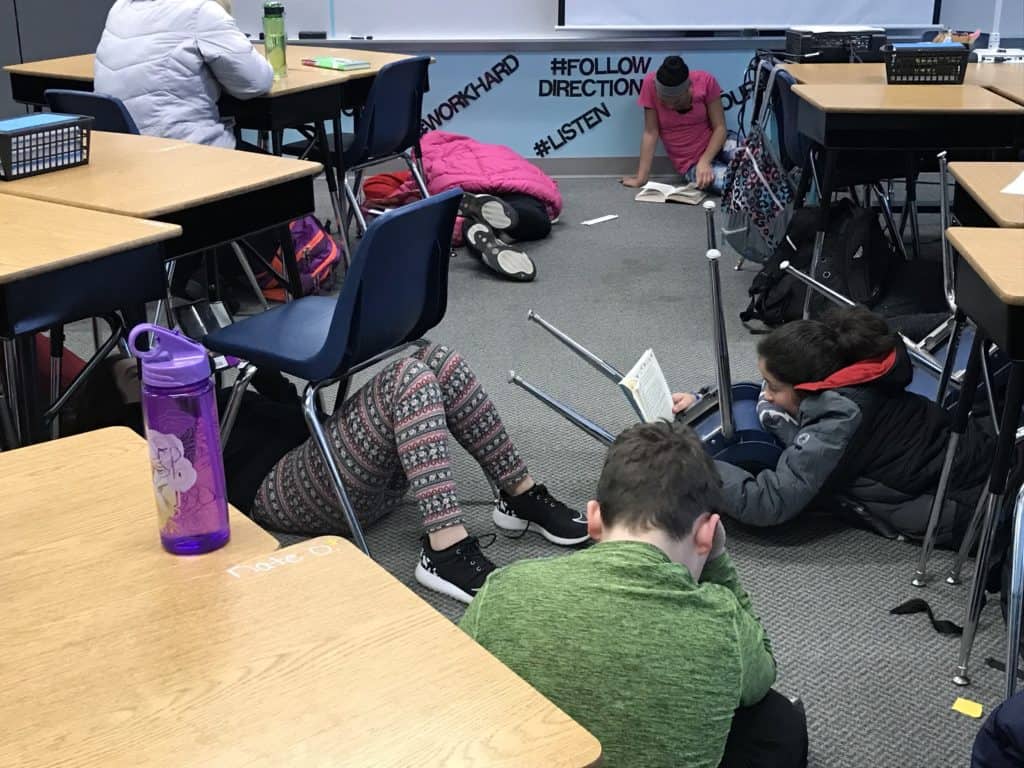
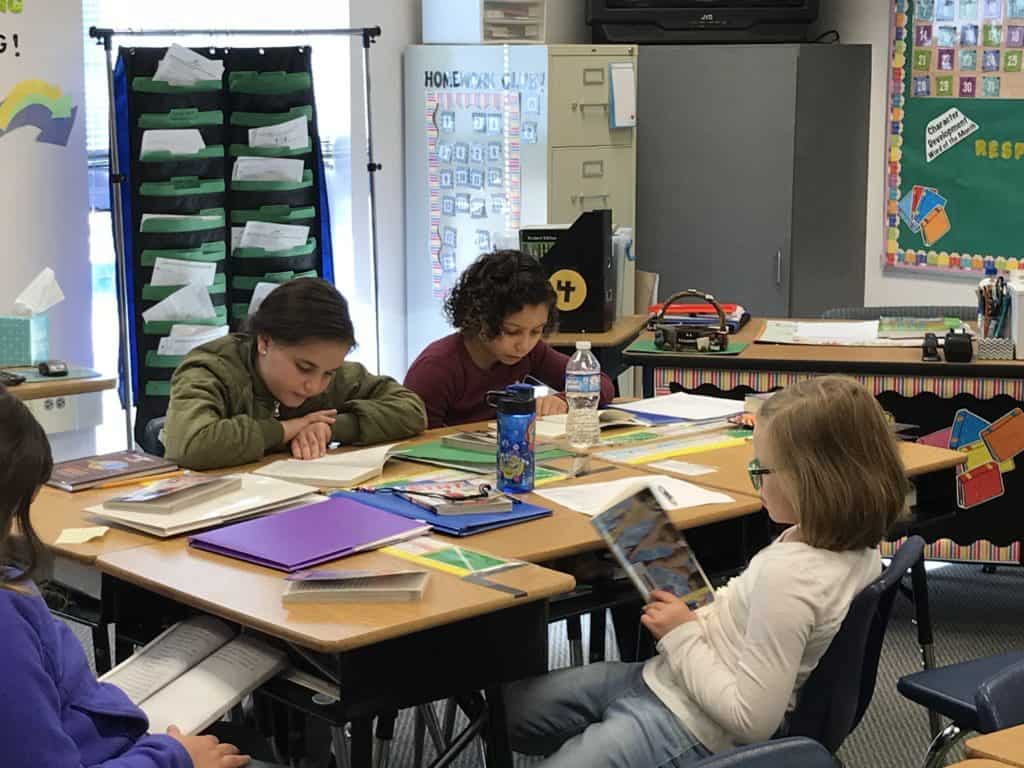
What to do the kids think about it all? 4th & 5th Grade Students: Brock, Bailey, Julio, Camrun, Jaylen, Hunter, Savannah, Riccardo, and Osbaldo:
- ARC gives us the opportunity to read more books.
- At my old school, I didn’t have enough time to read my books.
- Last year I got books that were too hard and I couldn’t read them.
- ARC focuses on one thing, one topic at a time – where you can really get an idea of what it means, what happens, instead of half of this and half of that.
- I like it when we read it (a book) together because you can get others’ opinions. I like being in book arguments.
- I never get bored. English and social studies are my favorite subjects.
- ARC is more informational. Last year we just searched for things and wrote it down.
ARC Core has a lot of moving parts. What do the teachers say about it implementing it? From Mss. Ashley Martin, Latina Dixon, Alex Faulkner, Melissa Wilson, and Shannon Vaka (Curriculum Facilitator):
- The rigor in this curriculum is huge. In the beginning, it’s hard. I kept asking myself, “How am I ever going to get them to think this deeply about the text.”
- I would put it somewhere between 1-3 (on a 5-point difficulty scale with 5 being the hardest).
- I used a program before where all students read grade level texts but what’s different here is that they’re (the students) able to make it come alive with books on the same topic.
- What’s different here is that when we finish with our independent text, they talk with their classmates and its broadening their horizons, they’re sharing with each other, they’re discussing it, and adding to their reading lists.
- I really appreciate that it took the best of other programs and brought it all together.
- I thought I was going to miss small groups – but this way you get to know the individual readers so much better…you’re working on a very tiny, short-term, specific goal. When they’re ready, you move them.
- The greatest difference I see is with our struggling readers.
Perhaps part of the reason Monticello-Brown’s teachers aren’t more overwhelmed by implementing the new ARC curriculum is because principal Christopher Scott – yes, a first year principal in SY 2016-17 when ARC Core was rolled out and now chief cheerleader in the district – has invested so significantly in professional development. He saw the curriculum being used in summer school, signed Monticello-Brown up as an early adopter, and hasn’t looked back. Scott has also put at least 25% of his Title I dollars into supporting PD, making it possible for the school to benefit from the on-site assistance of an ARC coach for 14 days this school year.
Third-grade teacher Alex Faulkner was just three weeks into using the curriculum (following maternity leave) when we visited and sat in on her coaching session. Alex confessed that she was still struggling to figure out in what order to do things – should she work with the skills first or dive into the content? The ARC coach suggested she could, in fact, intentionally connect them. The book Ms. Faulkner’s students were reading was an informational text about bugs and the coach used as an example of a question she might have asked, “Which detail would be most helpful to a bug researcher?” “Oh, I get it; I could blend them together.”
This “aha moment” strikes us as what it’s all about. Privileging content, while not abandoning language arts skills development, is a sea change for many teachers. We saw it on full display at Monticello- Brown Summit. The important point is this: While the curriculum is maturing, teachers are learning, and full implementation across the school and district is taking shape, children are reading and writing – more than they ever have, and about more interesting and important topics than previously in their school careers. It will make a mountain of difference in these children’s lives.
